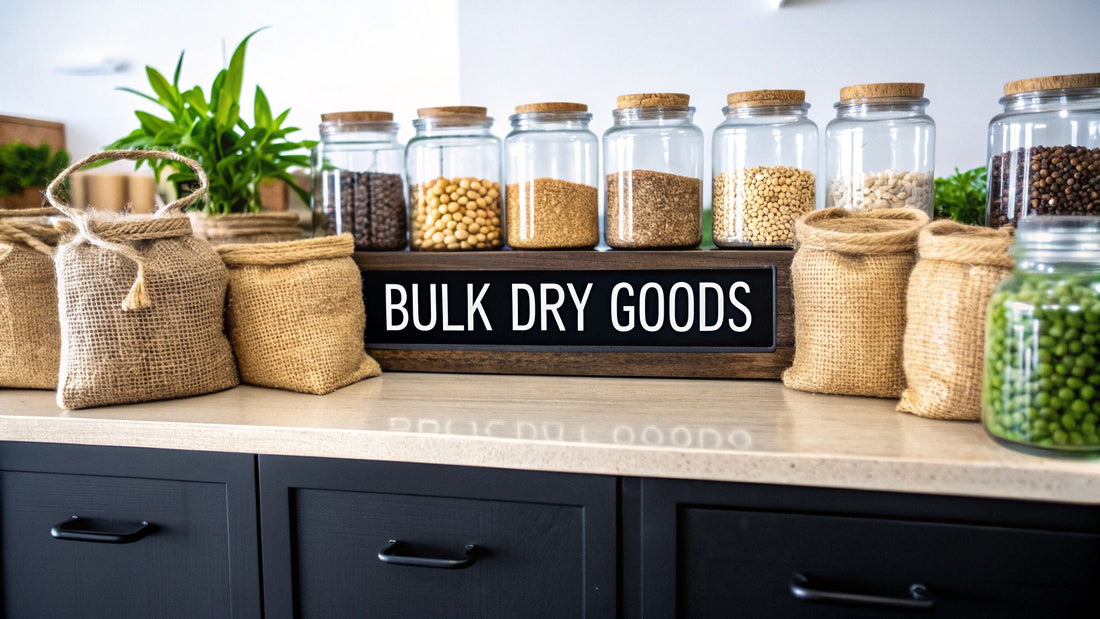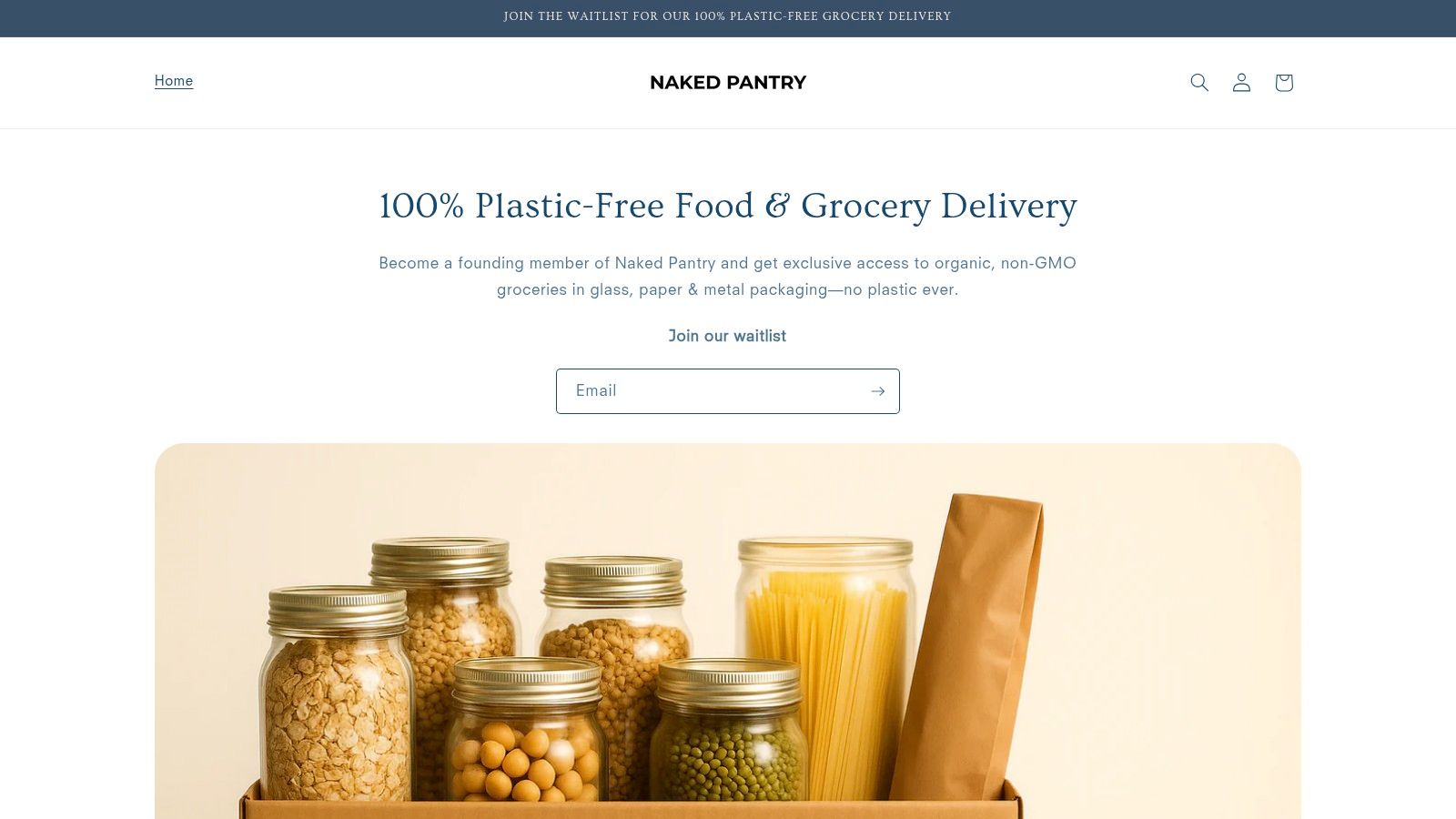
Discover Bulk Dry Goods for a Sustainable Kitchen
Share
Building a Better Pantry, One Bulk Dry Good at a Time
Want a healthier, zero-waste pantry? This list covers eight essential bulk dry goods—like rolled oats, pinto beans, and all-purpose flour—to help you ditch plastic packaging and embrace sustainable eating. Learn how to store these staples, discover their benefits, and find plastic-free sources, including options like Naked Pantry. Bulk dry goods are key to reducing waste and improving the quality of food you consume.
1. Naked Pantry
Stocking your pantry with bulk dry goods is a smart strategy for efficient meal prep and minimizing food waste. However, sourcing these staples in a truly sustainable way can be challenging. Conventional bulk bins often lack transparency regarding sourcing and frequently rely on single-use plastic bags. Enter Naked Pantry, a subscription service designed to revolutionize how we acquire bulk dry goods while prioritizing both personal and planetary health. This innovative platform delivers organic, non-GMO pantry staples directly to your door, completely free of plastic packaging. By utilizing compostable paper, glass jars, and metal tins, Naked Pantry eliminates the health risks associated with plastic toxins like BPA and phthalates, while also significantly reducing the environmental burden of plastic waste. This approach makes it a game-changer for those seeking a convenient, eco-friendly solution for buying bulk dry goods.

For the eco-conscious consumer seeking to minimize their impact while maximizing their nutritional intake, Naked Pantry presents a compelling option. Imagine a pantry stocked with organic grains, legumes, nuts, seeds, and other essentials, all delivered in reusable or compostable containers. This eliminates the guilt associated with single-use plastic and contributes to a circular economy model. Instead of contributing to overflowing landfills with plastic packaging that takes centuries to decompose, you're actively participating in a system that values resource conservation and waste reduction. This resonates deeply with the zero-waste movement and supports a lifestyle that prioritizes both personal and environmental well-being.
Naked Pantry distinguishes itself by focusing on the quality and sourcing of its bulk dry goods. Prioritizing organic and non-GMO products, often sourced from U.S. growers, ensures that consumers receive high-quality, nutrient-rich staples free from harmful pesticides and genetically modified organisms. This is crucial for those following clean eating principles, adhering to functional medicine protocols, or simply seeking to nourish their bodies with the purest ingredients possible. The emphasis on transparency in sourcing builds trust and empowers consumers to make informed choices about the food they consume.
The convenience of a subscription service further enhances the appeal of Naked Pantry. By streamlining the process of acquiring bulk dry goods, it simplifies meal planning and grocery shopping, freeing up valuable time and energy. While specific details regarding subscription options and pricing are not currently publicly available, requiring prospective customers to join a waitlist, this exclusivity adds to the allure for those eager to embrace a truly sustainable and health-conscious lifestyle. Being a founding member of this movement towards zero-waste pantry essentials holds a certain appeal for those dedicated to pioneering change in the food industry.
While the waitlist model might present a temporary barrier to entry, it also allows Naked Pantry to carefully scale its operations and ensure the highest quality of service. This approach suggests a commitment to maintaining ethical sourcing practices and sustainable packaging solutions as the company grows. For those truly invested in minimizing their environmental footprint and prioritizing their health, the waitlist represents a small price to pay for access to such a unique and valuable service.
Compared to traditional bulk bins at grocery stores, Naked Pantry offers superior control over sourcing and packaging. While some stores offer bulk bins, the lack of transparency regarding the origin of the products and the prevalence of plastic bags can be deterrents for eco-conscious consumers. Naked Pantry addresses these concerns head-on, providing a clear and compelling alternative.
Implementing Naked Pantry into your lifestyle involves signing up for the waitlist on their website (https://www.nakedpantry.co). Once accepted, you can presumably customize your subscription based on your specific needs and preferences. While the specific details regarding pricing and customization options remain undisclosed pending full launch, the promise of a 100% plastic-free, organic, and convenient bulk dry goods delivery service makes Naked Pantry a compelling prospect for the discerning, eco-conscious consumer. It represents a significant step towards a more sustainable and healthy future for both individuals and the planet.
2. Wheat Berries / Wheat Grain
Wheat berries, often overlooked in today's world of readily available flours and processed foods, are a powerhouse of nutrition and versatility, deserving a prominent spot in any bulk dry goods collection. These unprocessed kernels, essentially the entire wheat grain with just the outer hull removed, offer a connection to a simpler, more sustainable approach to food. For the eco-conscious, health-focused individual seeking control over their food sourcing and preparation, wheat berries are an excellent choice. They represent a step towards self-sufficiency, reduced reliance on industrially processed foods, and a deeper understanding of where our food comes from.

Wheat berries are a staple bulk dry good with remarkable storage longevity, making them a cornerstone of emergency preparedness plans. Stored correctly in airtight containers in a cool, dry, and dark environment, these grains can maintain their quality for an impressive 10-30 years, providing a secure source of calories and vital nutrients in times of crisis. This extended shelf life aligns perfectly with the principles of sustainability and minimizing food waste, a key concern for the eco-friendly consumer.
The nutritional profile of wheat berries contributes significantly to their value. Packed with 12-15% protein and complex carbohydrates, they provide sustained energy release, avoiding the spikes and crashes associated with refined grains. This makes them ideal for those following a clean-eating approach, prioritizing whole, unprocessed foods for optimal health. Furthermore, wheat berries are a natural source of fiber, crucial for digestive health, and contain various B vitamins and minerals, further enhancing their nutritional value. For those interested in functional medicine and naturopathic approaches, wheat berries are a valuable addition to a nutrient-dense diet.
One of the greatest advantages of wheat berries lies in their versatility. They can be ground into fresh, whole wheat flour using a home grain mill. This empowers you to control the quality and freshness of your flour, eliminating additives and preservatives often found in commercially produced options. Freshly milled flour unlocks the full spectrum of nutrients and flavor, enriching baking experiences and offering a more natural and wholesome approach. This aligns perfectly with the zero-waste philosophy by utilizing the entire grain and reducing packaging waste.
Beyond flour production, wheat berries can be cooked whole, much like rice or other grains. They create a chewy, nutty, and satisfying base for salads, grain bowls, or as a side dish. Soaking the berries overnight reduces the cooking time and enhances their digestibility. Sprouting wheat berries adds another dimension to their nutritional profile, increasing the bioavailability of certain vitamins and minerals. Sprouts can be added to salads, sandwiches, or enjoyed on their own as a nutrient-rich snack.
The price of wheat berries is another compelling factor. Purchased in bulk, they are a remarkably cost-effective source of calories and nutrition, offering a significant advantage over processed grains and flours. This makes them an accessible choice for those seeking affordability alongside quality and sustainability. They are readily available from various suppliers, including online retailers like USA Emergency Supply, local health food stores, and co-ops, catering to the growing demand for natural and unprocessed foods.
While the benefits of wheat berries are numerous, there are a few considerations. Grinding them into flour requires a grain mill, representing an initial investment. Cooking whole berries requires a longer cooking time compared to refined grains, and most importantly, they contain gluten, making them unsuitable for those with celiac disease or gluten intolerance.
For the health-conscious consumer, particularly those following organic, non-GMO, and grass-fed diets, sourcing organically grown wheat berries is recommended. This ensures the grains are free from pesticides, herbicides, and GMOs, aligning with a commitment to clean eating and environmental responsibility. Wheat berries represent a simple yet powerful tool for taking control of your food choices, aligning with values of sustainability, health, and self-sufficiency. They are a valuable addition to any bulk dry goods collection, offering a versatile and nutritious foundation for a more mindful and eco-friendly lifestyle.
3. White Rice (Long Grain)
White rice, particularly the long-grain variety, earns its spot as a cornerstone of bulk dry goods for its remarkable versatility, affordability, and extended shelf life. As a staple food for a significant portion of the global population, its importance in food security and emergency preparedness cannot be overstated. For those embracing eco-conscious lifestyles, buying white rice in bulk aligns with minimizing packaging waste and reducing transportation costs associated with smaller purchases.
This polished grain offers a blank canvas for culinary creativity, seamlessly integrating into a vast array of dishes. Its neutral flavor profile readily absorbs the flavors of accompanying sauces, spices, and other ingredients, making it an ideal base for stir-fries, curries, bowls, and casseroles. From a health-conscious perspective, white rice, while not as nutrient-dense as brown rice, provides easily digestible carbohydrates for sustained energy, which is especially beneficial for individuals with sensitive digestive systems. Moreover, its gluten-free nature makes it a safe and satisfying option for those with celiac disease or gluten intolerance.
One of the most compelling reasons to incorporate bulk white rice into your pantry is its exceptional shelf life. When stored correctly in a cool, dry, and airtight container – ideally a food-grade plastic bucket with a gamma seal lid – white rice can last for an impressive 4-5 years. This remarkable longevity makes it an essential component of long-term food storage plans, providing a reliable source of calories in emergency situations or periods of economic uncertainty. This aligns perfectly with the principles of zero-waste and sustainability by reducing food spoilage and minimizing the need for frequent grocery shopping trips.
For those focused on clean eating, while white rice is refined and lacks the bran and germ of brown rice, it still offers a quick and convenient source of energy. Its simple preparation, requiring only water and heat, makes it an accessible option for busy individuals and those with limited kitchen equipment. It cooks in approximately 15-20 minutes, fitting seamlessly into even the most hectic schedules. While its nutritional profile may not be as robust as whole grains, enriching white rice often adds back some of the lost nutrients. You can further boost its nutritional value by incorporating it into dishes with plenty of vegetables, lean protein, and healthy fats.
Practical Applications & Use Cases:
- Emergency Food Storage: Its long shelf life and ease of preparation make it an ideal choice for emergency preparedness kits.
- Everyday Meals: A versatile base for countless recipes, from simple rice bowls to elaborate ethnic dishes.
- Baby Food: Easily digestible and bland, white rice is often used as a first food for babies.
- Gluten-Free Baking: Rice flour, made from finely ground white rice, can be used in gluten-free baking.
- Pet Food: Cooked white rice can be a soothing addition to a pet's diet in cases of digestive upset (always consult with a veterinarian).
Pricing and Technical Requirements:
Bulk white rice, typically available in 25-50 pound bags, offers significant cost savings compared to smaller retail packages. Prices vary depending on the supplier and quantity purchased but can range from roughly $0.50 to $1.00 per pound. WebstaurantStore is a good resource for pricing and bulk purchasing options. The primary technical requirement for storage is an airtight container and a cool, dry environment to prevent moisture and insect infestation.
Comparison with Similar Bulk Dry Goods:
Compared to other bulk grains like brown rice or quinoa, white rice offers a longer shelf life and a milder flavor. While brown rice boasts superior nutritional value, it requires a longer cooking time and has a shorter shelf life. Quinoa, a complete protein, offers exceptional nutritional benefits but is significantly more expensive than white rice. Each grain has its own unique characteristics and suitability depending on individual needs and preferences.
Implementation/Setup Tips:
- Storage: Store in airtight containers, such as food-grade buckets with gamma seal lids, in a cool, dry place.
- Pest Prevention: Consider adding oxygen absorbers or bay leaves to the storage container to deter insects. Freezing the rice for a few days before storing can also eliminate any potential insect eggs.
- Cooking: Rinse the rice before cooking to remove excess starch. Use a 2:1 water-to-rice ratio for optimal results.
By incorporating bulk white rice into your pantry, you embrace a practical and sustainable approach to food storage and meal preparation. Its affordability, versatility, and long shelf life make it an invaluable asset for individuals seeking a reliable, readily available, and easily prepared staple food.
4. Rolled Oats (Old-Fashioned Oats)
Rolled oats, often referred to as old-fashioned oats, are a cornerstone of bulk dry goods shopping for the health-conscious and eco-minded individual. These versatile flakes, created by steaming and flattening whole oat groats, offer a powerhouse of nutrition and culinary possibilities, making them a must-have for anyone embracing a sustainable, clean-eating lifestyle. Stocking up on rolled oats in bulk is not only economical but also reduces packaging waste, aligning perfectly with zero-waste principles. Their long shelf life, when stored correctly, makes them a practical and reliable staple for both everyday meals and emergency food preparedness.

One of the most significant advantages of rolled oats is their exceptional nutritional profile. They are a rich source of soluble fiber, especially beta-glucan, known for its cholesterol-lowering properties. This makes rolled oats a heart-healthy choice, promoting cardiovascular well-being and fitting seamlessly into a functional medicine approach to diet. Furthermore, their high fiber content contributes to digestive health and provides sustained energy, making them an ideal breakfast option for those seeking a stable blood sugar level throughout the morning. Rolled oats also offer a good source of plant-based protein (13-15%), essential for muscle repair and overall health, making them particularly appealing to those following a vegetarian or vegan lifestyle. They are also packed with important minerals like manganese, phosphorus, and magnesium, contributing to bone health, energy production, and numerous other bodily functions.
The versatility of rolled oats is another reason for their prominent place in the world of bulk dry goods. While they are a classic breakfast staple, easily prepared as oatmeal or overnight oats, their culinary applications extend far beyond the morning meal. Rolled oats can be incorporated into baked goods like muffins, cookies, and granola bars, adding a wholesome texture and nutty flavor. They can also be used as a binding agent in veggie burgers or meatloaf, or as a thickener in soups and stews. This adaptability makes them a valuable ingredient for anyone interested in creative and healthy cooking. For those following a non-GMO or organic diet, sourcing rolled oats from certified suppliers ensures the integrity of your bulk dry goods purchase.
When it comes to storage, rolled oats maintain their quality for 2-3 years if stored properly in a cool, dry, and airtight container. This extended shelf life aligns perfectly with the principles of eco-living and minimizes food waste. However, it’s important to be mindful of potential downsides. Rolled oats have a shorter shelf life compared to grains like wheat or rice, and they can become rancid if exposed to heat and humidity. Another point to consider, especially for those with celiac disease or gluten sensitivity, is the potential for cross-contamination during processing. While oats themselves are gluten-free, they may come into contact with gluten-containing grains in shared facilities. Look for certified gluten-free rolled oats if this is a concern.
While pricing for bulk rolled oats can vary depending on the supplier and quantity purchased, it is generally significantly more economical than purchasing smaller, pre-packaged containers. Many online retailers and local health food stores specializing in bulk dry goods offer competitive prices and often provide organic and non-GMO options. For instance, Quaker Oats (https://www.quakeroats.com), a well-known brand, offers information on various oat products, though purchasing in bulk may require sourcing from other suppliers. Comparing prices and checking for certifications are essential steps in maximizing the benefits of buying rolled oats as part of your bulk dry goods strategy.
In conclusion, rolled oats are a highly nutritious, versatile, and economical choice for those seeking to embrace a healthy, sustainable, and eco-friendly lifestyle. Their numerous health benefits, coupled with their culinary adaptability and long shelf life, make them a valuable addition to any bulk dry goods collection, catering to a variety of dietary needs and preferences, from clean eating to functional medicine and beyond.
5. Pinto Beans: A Bulk Dry Goods Powerhouse for Sustainable Eating
Pinto beans secure a prominent spot on any bulk dry goods list for their remarkable combination of nutritional value, affordability, and impressive shelf life. These speckled legumes are a true pantry staple, offering a versatile and sustainable foundation for countless meals. Whether you're focused on emergency preparedness, embracing a plant-based diet, or simply looking for economical and healthy meal options, pinto beans are a bulk dry goods essential.

For the eco-conscious consumer, purchasing pinto beans in bulk aligns perfectly with zero-waste principles. Buying in larger quantities reduces packaging waste and often comes at a lower price per pound. Storing them in airtight containers also minimizes food waste by preserving their freshness for an extended period. This makes them a smart choice for those striving for a more sustainable lifestyle.
Nutritional Powerhouse and Culinary Versatility:
Pinto beans are packed with nutrients that support a healthy lifestyle. A single cup of cooked pinto beans provides a substantial amount of protein (around 15 grams), making them an excellent choice for vegetarians, vegans, and anyone looking to reduce their reliance on animal protein. They are also rich in dietary fiber, which aids digestion and promotes gut health, a key focus for those interested in functional medicine and naturopathic approaches to wellness. The abundance of folate, iron, and other essential minerals makes pinto beans a nutrient-dense addition to any clean-eating plan.
From a culinary standpoint, pinto beans are incredibly versatile. They are a cornerstone of Mexican and Southwestern cuisine, forming the base for classic dishes like refried beans, burritos, and chili. They can also be incorporated into soups, stews, salads, and even veggie burgers. Their mild flavor readily absorbs spices and seasonings, allowing them to adapt to diverse culinary traditions. For those following a non-GMO or organic diet, sourcing pinto beans from reputable suppliers like Azure Standard (https://www.azurestandard.com) ensures the quality and integrity of your bulk dry goods purchase.
Practical Considerations for Bulk Storage and Preparation:
While dried pinto beans offer numerous advantages, there are a few practical considerations. The biggest is the preparation time. Unlike canned beans, dried pintos require soaking and cooking, which can take several hours. Soaking overnight is the most common method, softening the beans and reducing cooking time. A quicker alternative involves a rapid soak method: bring the beans to a boil, simmer for a few minutes, then let them soak for an hour. Pressure cooking significantly reduces cooking time, making it a convenient option for busy individuals.
Pricing for bulk pinto beans varies depending on the supplier and quantity purchased. Generally, you can expect to pay significantly less per pound compared to canned beans. Azure Standard, for example, often offers competitive pricing on bulk organic pinto beans. Check their website for current prices and availability.
Comparing Pinto Beans to Other Bulk Dry Goods:
Compared to other legumes like lentils or black beans, pinto beans have a slightly creamier texture and milder flavor. While lentils cook much faster, they lack the robust texture that makes pinto beans ideal for certain dishes. Black beans, while nutritionally similar, have a distinct flavor profile that may not be suitable for all recipes. Choosing the right legume depends on your individual dietary needs and culinary preferences.
Tips for Successful Pinto Bean Integration:
-
Proper Storage: Store dried pinto beans in airtight containers in a cool, dry, and dark place. This will maximize their shelf life, which can extend up to 10-20 years under ideal conditions.
-
Reduce Digestive Discomfort: Thorough soaking and rinsing help remove sugars that can cause gas and bloating. Introducing beans gradually into your diet can also allow your digestive system to adjust.
-
Maximize Flavor: Add aromatics like onions, garlic, and bay leaves during the cooking process to enhance the flavor of your pinto beans.
Pinto beans are a true champion in the world of bulk dry goods. Their exceptional nutritional value, long shelf life, versatility in the kitchen, and affordability make them an invaluable addition to any sustainable pantry. By incorporating this powerhouse legume into your regular meal planning, you'll be embracing a healthy, economical, and environmentally conscious approach to eating.
6. Granulated Sugar
Granulated sugar, a cornerstone of bulk dry goods, is far more than just a sweetener. Its versatility extends from everyday culinary uses to critical roles in food preservation, making it a staple for the health-conscious, eco-friendly shopper seeking to minimize waste and maximize the longevity of their homegrown or farmers market hauls. While often viewed simply as a source of empty calories, granulated sugar plays a crucial, and often irreplaceable, role in preserving seasonal bounty, reducing food waste, and supporting a self-sufficient lifestyle – values that resonate deeply with those committed to sustainable living. From canning peaches to crafting homemade jams, granulated sugar is the unsung hero of the preserving pantry. Buying in bulk not only reduces packaging waste but also ensures you have a readily available supply for all your preserving needs.

For the eco-conscious consumer, buying granulated sugar in bulk aligns perfectly with a zero-waste philosophy. Purchasing 25-50 pound bags drastically reduces packaging compared to repeatedly buying smaller quantities. This minimizes your environmental impact and contributes to a more sustainable lifestyle. Moreover, bulk purchasing often translates to cost savings, further incentivizing this eco-friendly practice.
One of the key features of granulated sugar is its indefinite shelf life when stored properly. This makes it a perfect candidate for bulk buying, especially for those engaged in seasonal preserving. Knowing that your sugar supply won’t expire allows for efficient utilization and minimizes waste. This long shelf life is a significant advantage for preserving enthusiasts, ensuring that their sugar remains viable throughout the year, ready for each season’s harvest.
Granulated sugar comes in various grades, offering flexibility for different applications. Fine and extra fine granulated sugars dissolve quickly, making them ideal for beverages and delicate baked goods. Regular granulated sugar, the most common variety, is versatile for general use in both sweet and savory dishes, and is particularly suited to canning and preserving. Understanding these nuances allows for a more tailored and successful approach to cooking and preserving.
While granulated sugar offers undeniable benefits, it's also crucial to be aware of its potential drawbacks. Sugar readily absorbs moisture, which can lead to clumping and hardening. Proper storage in airtight containers in a cool, dry environment is crucial to maintain its quality and prevent spoilage. Additionally, while sugar provides quick energy, it offers limited nutritional value beyond calories. It's essential to consume sugar in moderation as part of a balanced diet. Finally, sugar can attract insects and pests, necessitating careful storage practices to prevent infestations.
When purchasing bulk granulated sugar, you'll find that pricing can fluctuate based on commodity market trends. Monitoring these fluctuations can help you secure the best price. Websites like Domino Sugar (https://www.dominosugar.com) provide information about different sugar types and their applications, making them valuable resources for informed purchasing decisions. Furthermore, consider sourcing your bulk sugar from local suppliers or cooperatives to support local businesses and reduce transportation costs and environmental impact.
For the health-conscious individual focusing on clean eating, understanding the origin of your sugar is important. Look for brands that emphasize sustainable farming practices and minimize refining processes. Organic granulated sugar, while more expensive, can be a good option for those prioritizing organic ingredients. Furthermore, consider exploring alternative sweeteners like coconut sugar or maple syrup for specific applications where their unique flavor profiles can enhance your culinary creations. However, it's important to note that these alternatives may not be suitable for all preserving recipes, as granulated sugar's specific chemical properties are crucial for successful preservation in many cases.
By understanding the benefits, drawbacks, and proper storage techniques for bulk granulated sugar, you can effectively integrate this essential bulk dry good into your sustainable and health-conscious lifestyle.
7. All-Purpose Flour
All-purpose flour, a cornerstone of countless kitchens, earns its place on our bulk dry goods list for its versatility, affordability, and role in creating delicious and nutritious meals. Whether you're whipping up a simple weeknight dinner or embarking on a complex baking project, having a readily available supply of all-purpose flour is essential for both novice cooks and seasoned chefs. This pantry staple, especially when purchased in bulk, becomes an economical and convenient way to ensure you're always prepared for your culinary endeavors. Its inclusion in a bulk dry goods collection aligns perfectly with principles of reducing waste and maximizing efficiency in the kitchen, appealing to those embracing a zero-waste or eco-conscious lifestyle.

As a blend of hard and soft wheat, all-purpose flour offers a moderate protein content (10-12%), making it suitable for a broad range of baking applications. This balanced protein level allows it to create the desired texture in everything from fluffy cakes and flaky pastries to chewy breads and hearty pizza doughs. The enrichment process, adding iron, thiamine, riboflavin, niacin, and folic acid, further enhances its nutritional value, contributing to a healthier diet. For those following a clean-eating philosophy, this enrichment provides peace of mind, knowing that essential nutrients are incorporated into everyday baking.
Practical Applications and Use Cases:
The applications of all-purpose flour extend far beyond baking. It serves as a thickening agent in sauces, gravies, and soups, playing a crucial role in achieving the desired consistency. It also acts as a binder in meatballs, veggie burgers, and other dishes, helping to hold ingredients together. For those interested in homemade pasta, all-purpose flour is the primary ingredient, allowing for creative variations with added ingredients like spinach or herbs, aligning with a health-conscious approach to cooking.
Pricing and Storage:
Purchasing all-purpose flour in bulk offers significant cost savings compared to smaller, pre-packaged options. Prices vary depending on the brand and quantity, but generally, the larger the quantity purchased, the lower the price per pound. While bulk buying promotes a zero-waste mentality by reducing packaging, proper storage is crucial to maintain its quality and prevent insect infestation. A cool, dry, and airtight container is essential, and for extended shelf life (beyond the typical 6-8 months at room temperature), refrigeration or freezing is recommended. This is especially important for those prioritizing long-term food storage and minimizing waste.
Comparison with Similar Products:
While all-purpose flour is incredibly versatile, other flours cater to specific dietary needs and baking preferences. Whole wheat flour, for example, offers a higher fiber content and a nuttier flavor, appealing to health-conscious individuals. However, its higher protein content can result in denser baked goods. Gluten-free blends cater to those with celiac disease or gluten sensitivities, but they often require adjustments in recipes to achieve comparable results. Choosing the right flour depends on individual dietary requirements and desired baking outcomes.
Implementation Tips for Bulk Storage:
-
Invest in airtight containers: Glass or food-grade plastic containers with tight-fitting lids are ideal for preventing moisture and pests from reaching your flour.
-
Freeze for long-term storage: If you don't plan to use a large quantity of flour within a few months, freezing it in smaller, airtight containers can significantly extend its shelf life.
-
FIFO (First In, First Out): Label your containers with the purchase date and use the oldest flour first to minimize waste.
King Arthur Baking Company (the website linked) offers a wealth of information on different types of flour and their uses, making it an excellent resource for those seeking guidance on choosing the right flour for their baking needs. For the eco-conscious baker seeking high-quality ingredients, King Arthur Baking is often seen as a trusted source. Their commitment to quality and baking education makes them a valuable resource for both novice and experienced bakers. Buying in bulk from reputable sources, like King Arthur Baking, can be a positive step towards sustainable kitchen practices.
8. Sea Salt (Coarse/Fine)
Sea salt, a staple in kitchens worldwide, earns its place on this list of essential bulk dry goods not just for its culinary versatility, but also for its critical role in food preservation, a cornerstone of sustainable and zero-waste living. Harvested through the natural evaporation of seawater, this unrefined mineral powerhouse offers a range of benefits for the health-conscious, eco-friendly consumer seeking natural alternatives to processed ingredients. Stocking up on bulk sea salt allows for both culinary exploration and the confident preservation of seasonal harvests, reducing food waste and promoting self-sufficiency, key tenets of the eco-living movement.
Unlike heavily processed table salt, which often contains anti-caking agents and other additives, pure sea salt boasts a wealth of naturally occurring trace minerals like magnesium, potassium, and calcium. These minerals not only contribute to a more complex flavor profile but also offer potential health benefits appreciated by those following functional medicine or naturopathic principles. For individuals focused on clean eating and consuming non-GMO groceries, sea salt offers a pure, unadulterated seasoning option.
The indefinite shelf life of sea salt makes it a perfect addition to any bulk dry goods collection, aligning perfectly with zero-waste goals. Stored correctly in a cool, dry environment, it never expires or spoils, ensuring you always have this essential ingredient on hand for both everyday cooking and large-scale preservation projects. This long-term storage capability is especially valuable for those interested in preserving seasonal produce, allowing them to extend the enjoyment of their organic gardens or farmers market hauls well beyond the growing season.
Practical Applications and Use Cases:
- Food Preservation: Sea salt is crucial for fermenting vegetables, curing meats, and dry-brining, all traditional preservation methods that minimize reliance on refrigeration and reduce food waste. Its ability to draw out moisture and inhibit microbial growth makes it an essential tool for those embracing a more sustainable lifestyle.
- Culinary Uses: From seasoning soups and stews to adding a finishing touch to grilled meats and vegetables, sea salt elevates everyday cooking. Coarse sea salt adds a delightful crunch to salads and roasted vegetables, while finer varieties are ideal for baking and general seasoning.
- Health and Wellness: Adding sea salt to bathwater can create a soothing and mineral-rich soak, appreciated by those seeking natural remedies. Some individuals also use sea salt solutions for nasal rinses or gargles.
Comparing Sea Salt Varieties:
Sea salt is available in various grain sizes, each suited to different purposes. Fine sea salt dissolves easily and is perfect for general cooking and baking. Coarse sea salt is prized for its texture and is ideal for finishing dishes or adding to grinders. Flake sea salt, with its delicate, pyramid-like crystals, offers a burst of salty flavor and is often used as a finishing salt. Choosing the right grain size depends on your specific needs and culinary preferences.
Implementation and Setup Tips:
- Storage: Store bulk sea salt in airtight containers in a cool, dry place to prevent moisture absorption and clumping. Glass jars or food-grade plastic containers are good options.
- Grinding: If you purchase coarse sea salt, consider investing in a salt mill or mortar and pestle to grind it to the desired fineness for different applications.
- Pricing: While sea salt is typically more expensive than conventional table salt, buying in bulk can significantly reduce the cost per unit, making it a more economical choice in the long run. Precise pricing varies depending on the supplier and quantity purchased. (Check websites like https://www.mortonssalt.com for examples).
- Shipping: Be aware that the weight of bulk sea salt can increase shipping costs. Consider sourcing it from local suppliers or buying in larger quantities less frequently to minimize transportation expenses.
By incorporating bulk sea salt into your pantry, you are investing in a versatile, long-lasting, and naturally derived ingredient that supports a healthy, sustainable, and zero-waste lifestyle. Its role in preserving food, enhancing flavor, and promoting well-being makes it a deserving addition to this list of essential bulk dry goods for the eco-conscious consumer.
Bulk Dry Goods Comparison Table
| Product | Core Features/Quality ★ | User Experience/Use ✨ | Value & Price 💰 | Target Audience 👥 | Unique Selling Points 🏆 |
|---|---|---|---|---|---|
| Naked Pantry 🏆 | 100% plastic-free, organic, non-GMO grains & snacks | Convenient subscription delivery | Exclusive access, pricing undisclosed | Eco-conscious, health-minded, zero-waste lifestyle | Plastic-free packaging, combats microplastics, US-grown organic |
| Wheat Berries / Grain | Long storage (10-30 yrs), high protein (12-15%) ★★★★ | Versatile: flour, cooking, sprouting | Cost-effective, widely available 💰💰 | Bulk buyers, emergency preppers, bakers | Multi-variety wheat, natural fiber, long shelf life |
| White Rice (Long Grain) | Gluten-free, quick cook, shelf life 4-5 yrs ★★★★ | Easy prep, neutral flavor | Affordable, widely available 💰 | General consumers, gluten-free diets | Fast cooking, high energy density |
| Rolled Oats | High fiber, protein (13-15%), 2-3 yr shelf life ★★★★ | Quick prep, versatile for baking | Moderate cost 💰 | Breakfast eaters, bakers, health-conscious | Beta-glucan fiber, heart-healthy |
| Pinto Beans | High protein (21-25%), long storage (10-20 yrs) ★★★★ | Requires soaking/long cooking | Very economical 💰💰 | Vegetarians, emergency preppers | Rich nutrient profile, plant-based protein |
| Granulated Sugar | Indefinite shelf life, essential for preservation ★★★ | Quick energy, baking staple | Low cost bulk 💰💰 | Bakers, food preservers | Never expires, critical for canning |
| All-Purpose Flour | Moderate protein (10-12%), enriched, 6-8 mo shelf ★★★ | Versatile baking ingredient | Affordable and available 💰 | Bakers, home cooks | Enriched nutrients, consistent quality |
| Sea Salt (Coarse/Fine) | Indefinite shelf life, trace minerals ★★★ | Essential for seasoning/preservation | Mid to higher price 💰 | Cooks, preservers | No additives, natural mineral content |
Stocking Up Sustainably: Your Journey to a Plastic-Free Pantry Starts Now
Transitioning to a plastic-free pantry filled with wholesome bulk dry goods is a powerful step towards a more sustainable lifestyle. From staple grains like wheat berries and long grain white rice to pantry essentials like rolled oats, pinto beans, all-purpose flour, granulated sugar, and sea salt, embracing bulk buying empowers you to minimize plastic waste, control ingredient quality, and often save money. Remember that the right storage containers, like airtight glass jars or reusable cloth bags, are key to maintaining freshness and preventing pests. Consider your available space and the quantity of bulk dry goods you typically purchase when selecting your storage solutions.
This journey starts with small, manageable changes. Begin by incorporating a few of these bulk dry goods into your routine, gradually expanding your plastic-free repertoire as you gain confidence. Experiment with different storage methods to find what works best for your kitchen and lifestyle. Most importantly, focus on the positive impact you're making by choosing sustainable practices.
Ready to simplify your transition to a plastic-free pantry stocked with high-quality bulk dry goods? Naked Pantry delivers organic and sustainably sourced essentials directly to your door, eliminating plastic packaging and making eco-conscious choices effortless. Visit Naked Pantry today and discover the convenience of building a healthier, more sustainable pantry.
